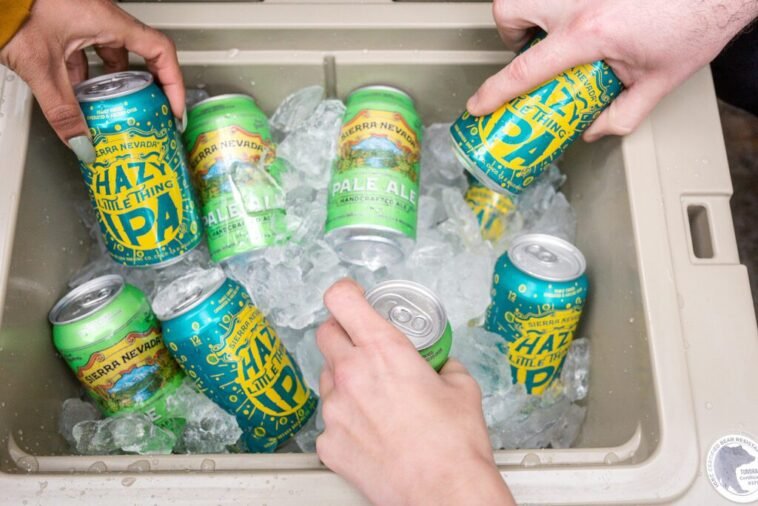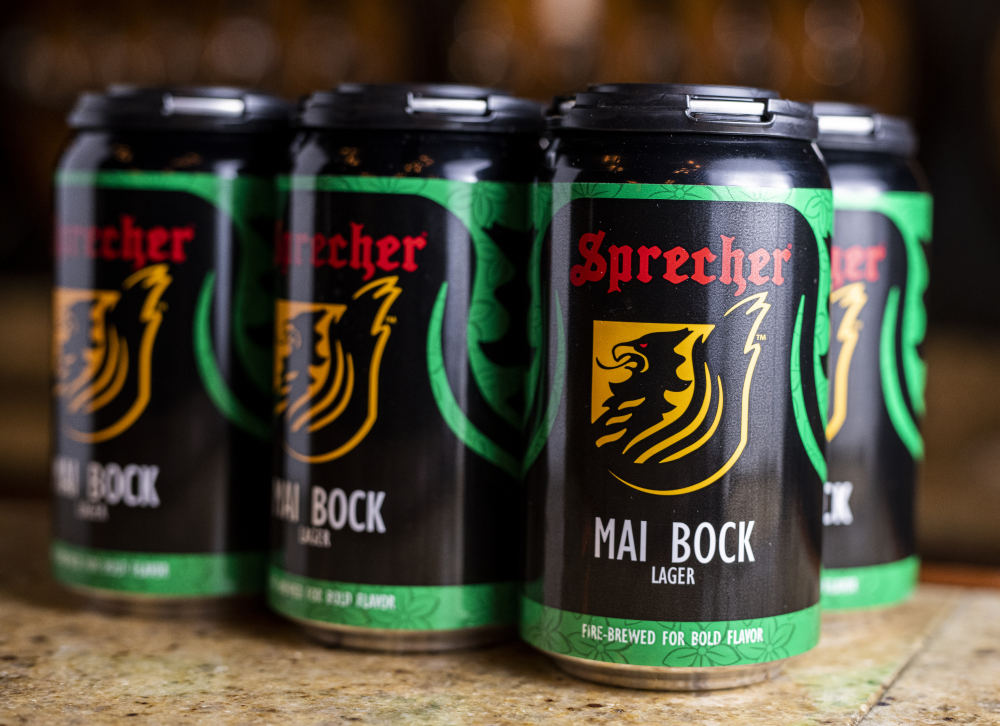Canned beer generally lasts longer than bottled beer in your fridge. This is due to better protection from light and oxygen.

Beer lovers often debate the merits of canned versus bottled beer. Both packaging types have pros and cons, but longevity in your fridge is a crucial factor. Cans offer superior protection from light and oxygen, which can degrade beer quality over time.
This means your beer stays fresher and longer when stored in cans. Bottled beer, while often preferred for its traditional appeal, is more susceptible to light exposure and oxygen ingress. This can lead to quicker spoilage and a less enjoyable drinking experience. Understanding these differences can help you make a more informed choice for your beer storage needs.
Introduction To Beer Preservation
Welcome to our blog post on the fascinating topic of beer preservation. Beer enthusiasts often wonder how to keep their favorite brews fresh. This post will explore the differences between canned and bottled beer. Specifically, we’ll focus on what lasts longer in your fridge.
Importance Of Shelf Life
The shelf life of beer is crucial for maintaining its quality. Freshness affects the taste, aroma, and overall experience. Most beers have a shelf life of a few months. Yet, some factors can extend or shorten this period.
Understanding the shelf life helps you enjoy beer at its best. It also prevents waste and ensures you get the most out of every bottle or can.
Factors Affecting Beer Longevity
Several factors impact how long beer lasts:
- Light Exposure: Light can spoil beer quickly. Bottled beer, especially in clear or green bottles, is more vulnerable. Canned beer is better protected from light.
- Oxygen Exposure: Oxygen can cause beer to go stale. Cans are sealed tightly, reducing oxygen exposure. Bottles can sometimes let air in, affecting the beer.
- Temperature: Beer should be stored at a consistent, cool temperature. Fluctuations can spoil the beer. Both cans and bottles need a stable fridge temperature.
To summarize, cans generally offer better protection from light and oxygen. This often results in a longer shelf life compared to bottles.
Here’s a quick compere’s:
| Factor | Canned Beer | Bottled Beer |
|---|---|---|
| Light Exposure | Low | High |
| Oxygen Exposure | Low | Moderate |
| Temperature Stability | Good | Good |
| Shelf Life | Longer | Shorter |
Knowing these factors helps you make an informed choice. Next, we’ll dive deeper into the aspect of beer preservation.

Credit: www.amazon.com
Packaging Types
Beer packaging plays a vital role in freshness. The type of packaging affects how long beer lasts in your fridge. Let’s dive into theLet’sils of canned and bottled beer to see which lasts longer.
Canned Beer
Canned beer is famous for a reason. It offers several advantages:
- Light Protection: Cans block all light, preventing skunking.
- Seal Quality: Cans seal better than bottles, keeping air out.
- Durability: Cans are less likely to break compared to bottles.
These factors help canned beer stay fresh for longer. Proper storage is still essential for the best results.
Bottled Beer
Bottled beer has its own set of features:
- Flavor Preservation: Bottles are often preferred for their flavor preservation.
- Glass Inertness: Glass does not react with the beer, maintaining its taste.
- Variety: Bottles come in various sizes and shapes.
Despite these benefits, bottled beer has some downsides. Light can penetrate clear and green bottles, affecting beer quality. Brown bottles offer better protection but are not perfect.
The table below highlights the key differences:
| Aspect | Canned Beer | Bottled Beer |
|---|---|---|
| Light Protection | Excellent | Varies (Brown is better) |
| Seal Quality | High | Moderate |
| Durability | High | Low |
| Flavor Preservation | Good | Excellent |
Overall, both packaging types have their pros and cons. Your choice may depend on your storage conditions and personal preference.
Material Differences
Material difference plays a crucial role in choosing between canned and bottled beer. Different materials impact the shelf life and taste. Learn how aluminum cans and glass bottles affect your beer.
Aluminum Cans
Aluminum cans protect beer from light and oxygen. This keeps the beer fresher for longer. Light and oxygen can spoil beer quickly. Aluminum cans are also lightweight and easy to store. They cool faster in the fridge.
Aluminum cans are also more eco-friendly. They are often recycled. This reduces waste. Cans have a tight seal that keeps beer carbonation intact. This means your beer stays fizzy longer.
- Block light and oxygen
- Lightweight and easy to store
- Eco-friendly and recyclable
- Tight seal for better carbonation
Glass Bottles
Glass bottles are traditional and offer a classic feel. They also protect beer from oxygen. But they are not as good at blocking light. Dark glass bottles do a better job. Yet, they are still not as effective as cans.
Glass bottles are heavier. They take longer to cool in the fridge. They are also more fragile. This means they can break more easily. Glass bottles can be recycled, but not as often as cans.
- Classic feel and traditional look
- Protects from oxygen but not light
- Heavier and take longer to cool
- Fragile and can break easily
| Feature | Aluminum Cans | Glass Bottles |
|---|---|---|
| Light Protection | Excellent | Good |
| Oxygen Protection | Excellent | Good |
| Weight | Lightweight | Heavy |
| Cooling Time | Fast | Slow |
| Durability | Durable | Fragile |
| Recyclability | High | Moderate |

Credit: sprecherbrewery.com
Impact Of Light Exposure
Light exposure plays a significant role when deciding between canned and bottled beer. Light can impact the taste and longevity of your beer. This section explores how light affects beer in cans versus bottles.
Uv Sensitivity
Beer is sensitive to UV light. UV light can cause the beer to become “skunky.” This happens because”use UV light breaks down hop compounds. This process generates unpleasant flavors. Bottled beer is more prone to this issue.
Protection Mechanisms
Canned beer provides better protection from light. The cans are entirely opaque. They block all light from reaching the beer. This helps maintain the beer’s freshness longer.
Bottled beer offers less protection. Clear and green bottles let in more light. Brown bottles offer better protection. But even they are not as effective as cans.
Here is a quick comparison:
| Container Type | Light Protection |
|---|---|
| Clear Bottle | Poor |
| Green Bottle | Fair |
| Brown Bottle | Good |
| Can | Excellent |
Choose cans for better light protection. This helps your beer last longer in the fridge.
Oxygen Exposure
Oxygen exposure affects beer quality. It causes oxidation which can spoil the taste. Knowing how cans and bottles handle oxygen is crucial.
Sealing Techniques
Canned beer uses a hermetic seal. This seal keeps oxygen out. The lid is crimped onto the can. This method is highly effective.
Bottled beer uses caps or corks. These are less effective at sealing. Oxygen can seep in over time. Bottles are more prone to leaks.
| Container | Sealing Technique | Effectiveness |
|---|---|---|
| Cans | Hermetic Seal | High |
| Bottles | Caps/Corks | Moderate |
Oxidation Effects
Oxidation occurs when oxygen interacts with beer. This alters the flavor. It can give beer a stale taste. Cans limit this process significantly.
Bottles are more vulnerable to oxidation. Over time, this can ruin the beer. Proper storage helps, but cans are inherently better.
- Stale taste
- Color changes
- Loss of freshness
Temperature Stability
When it comes to the longevity of beer, temperature stability plays a crucial role. Whether your beer is canned or bottled, how it handles temperature changes can affect its taste and shelf life. Let’s dive into how storage and temperature fluctuations impact your beer’s quality.
Colbeer’sage
Storing beer in a relaxed environment is critical. Canned beer tends to fare better in cold storage. The metal can act as an excellent insulator, keeping the beer at a consistent temperature. Bottled beer, on the other hand, can be more sensitive to temperature changes. Glass doesn’t insulate doesn’t metal, making bottled beer more prone to temperature variations.
Here’s a quick compere’s:
| Packaging | Cold Storage Efficiency |
|---|---|
| Canned Beer | High |
| Bottled Beer | Moderate |
Temperature Fluctuations
Temperature fluctuations can spoil beer quickly. Canned beer is less affected by these changes. The airtight seal of cans prevents air and light from affecting the beer. This keeps the beer fresher for more extended periods. Bottled beer, with its glass packaging, is more susceptible to light and air exposure.
To summarize:
- Canned beer: Better at withstanding temperature fluctuations.
- Bottled beer: More vulnerable to temperature changes.
Maintaining a consistent temperature is crucial. Store your beer in a cool, dark place to ensure it lasts longer.
Taste And Freshness
Taste and freshness are key factors when it comes to beer. People often wonder if canned or bottled beer holds its flavor longer. Let’s explore this. Let’s go into the aspects of flavor preservation and freshness indicators.
Flavor Preservation
Canned beer often preserves flavor better than bottled beer. The metal can block light completely. This helps protect the beer from becoming “skunky.” Bottles, “special” clear or green, allow light to penetrate. This can affect the taste negatively.
Cans also have a tighter seal. This reduces the chance of oxygen entering the beer. Oxygen can cause the beer to taste stale over time. Bottles may not always have the same level of airtight protection.
Freshness Indicators
Look at the expiration date on both cans and bottles. This will tell you how long the beer should remain fresh. Pay attention to the storage conditions as well. Both types of beer should be kept in a cool, dark place.
Some breweries include a “born on” date. The” tells “you when the beer was brewed. The fresher the beer, the better it will taste. Check for any changes in color or smell. This can indicate that the beer has gone wrong.
| Factor | Canned Beer | Bottled Beer |
|---|---|---|
| Light Protection | Excellent | Poor to Moderate |
| Oxygen Protection | Excellent | Moderate |
| Storage | A cool, dark place | A calm, dark place |
| Freshness Indicator | Expiration date, born on date | Expiration date, born on date |
By understanding these factors, you can make a better choice for your fridge. Enjoy your beer at its best taste and freshness!

Credit: www.reddit.com
Practical Tips For Storage
Storing beer correctly ensures it stays fresh and tasty. Knowing the best storage methods is crucial, whether you prefer canned or bottled beer. This section will cover practical tips to keep your beer at its best.
Optimal Fridge Conditions
Your fridge should be set to the right temperature. Keep it between 34°F and 38°F. This keeps the beer cold but not frozen. Make sure your fridge has good airflow. Crowded fridges can trap warm air.
Light exposure can spoil beer. Store beer away from the fridge light. Choose a fridge with a solid door if possible. Be mindful of temperature fluctuations. Avoid frequently opening the fridge door.
Storage Duration
Canned beer usually lasts longer than bottled beer. Cans protect beer from light and air. On average, canned beer stays fresh for 6-9 months. Bottled beer, especially in clear or green bottles, lasts about 3-6 months.
Here’s a quick compere’s:
| Type | Storage Duration |
|---|---|
| Canned Beer | 6-9 months |
| Bottled Beer | 3-6 months |
For both types, check the expiration date. Always consume beer before it expires. Proper storage can extend the freshness of your beer.
Frequently Asked Questions
What Lasts Longer, Canned Beer Or Bottled Beer?
Canned beer generally lasts longer than bottled beer. Cans prevent light exposure and have a better seal, preserving freshness.
Do Beer Cans Or Bottles Stay Colder Longer?
Beer bottles generally stay colder longer than cans. Glass insulates better, keeping the beer chilled. Cans, however, cool faster.
How Long Does Bottled Beer Last In The Fridge?
Bottled beer lasts 6-8 months in the fridge. Keep it sealed and stored at a consistent temperature for the best quality.
Is Beer Better From A Can Or Bottle?
Beer preference between cans and bottles depends on personal taste. Cans protect beer from light and are more portable. Bottles often provide a better drinking experience.
Conclusion
Choosing between canned and bottled beer depends on your storage and taste preferences. Canned beer typically lasts longer due to better light protection. Bottled beer offers a traditional feel but may spoil faster. Consider your fridge space and drinking habits.
Both options have their merits, so pick what suits you best.


GIPHY App Key not set. Please check settings